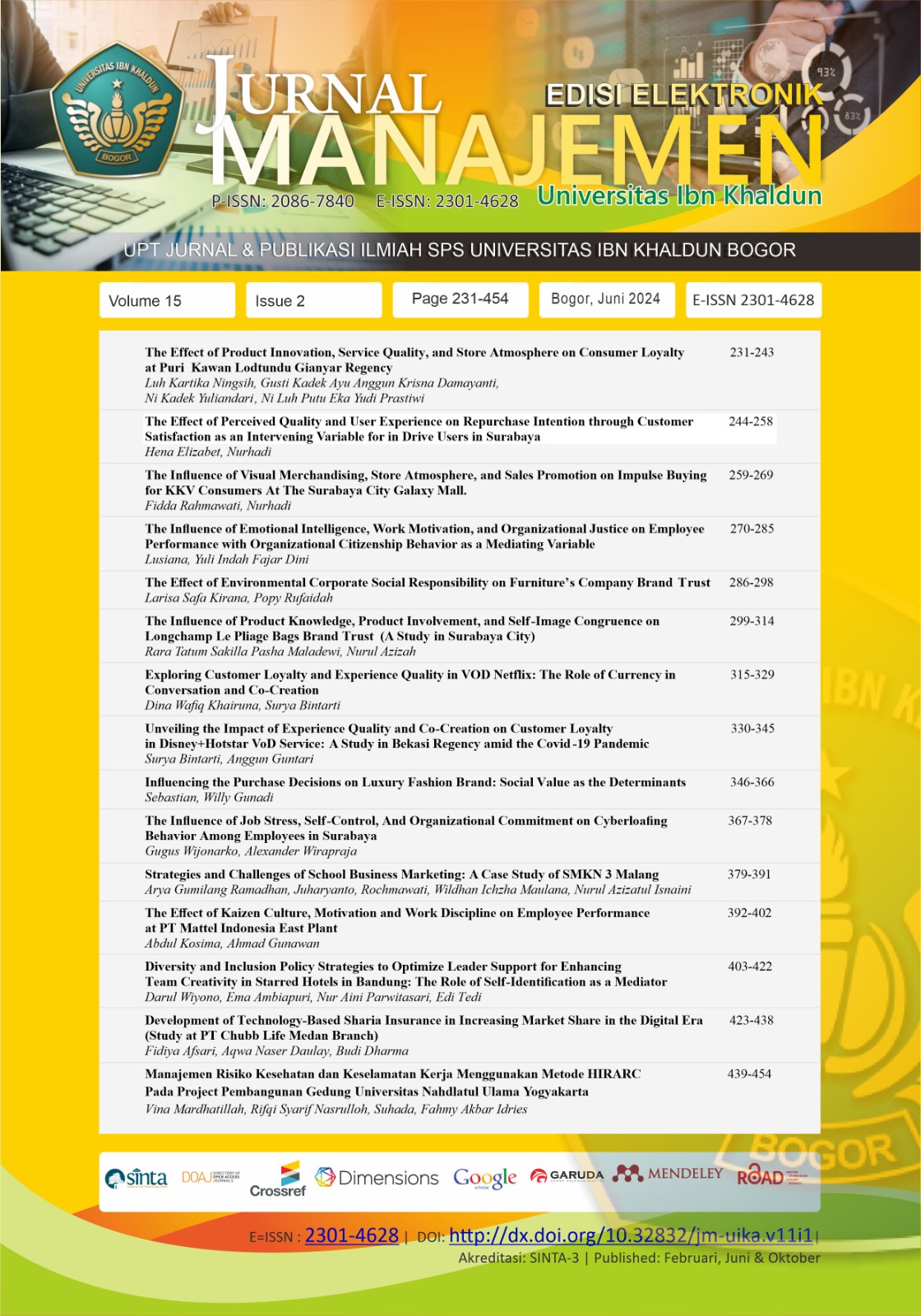The Influence of Job Stress, Self-Control, and Organizational Commitment on Cyberloafing Behavior Among Employees in Surabaya.
DOI:
https://doi.org/10.32832/jm-uika.v15i2.16340Kata Kunci:
Work-Stress, Self Control, Organizational Commitment, CyberloafingAbstrak
Human resources are an important asset in a company, it is assumed that employees who work well will improve the quality of work which has an impact on company productivity. The effort to achieve this is to raise awareness among employees not to spend their working time doing things that are not related to their work, for example by wasting time playing with gadgets during working hours, which is referred to as cyberloafing behavior. The tendency of employees to have this behavior is sometimes caused by a lack of self-control, work stress factors, which causes employees to tend to procrastinate work and make work unfinished. Based on this background, this research aims to determine the influence of self-control, motivation and cyberloafing behavior on the performance of private employees in Surabaya. This research uses a quantitative approach with multiple linear regression methods and uses a sampling method using a purposive sampling method. The population and sample in this research were company employees in Surabaya who were taken randomly. Based on the results of distributing questionnaires and measuring scales using a Likert scale, 127 respondents were obtained. The results of questionnaire data processing show that work stress has no influence on cyberloafing behavior, but the variables of self-control and organizational commitment are proven to influence cyberloafing behavior.
Referensi
Al Utsmani, M. M., & Sukarno, G. (2022). Analisis Stres Kerja dan Cyberloafing terhadap Kinerja Pegawai BKPSDM Tuban. Journal of Management and Bussines (JOMB), 4(2), 983–995. https://doi.org/10.31539/jomb.v4i2.4362
. Attiq, K., & Filatrovi, E. W. (2022). Pengelolaan Burnout Karyawan Guna Menghentikan Cyberloafing. Among Makarti, 15(1), 52–64. https://doi.org/10.52353/ama.v15i1.232
. Cahyaningrum, W., & Yulianti, A. E. (2022). Self Control, Motivasi dan Cyberloafing terhadap Kinerja Pegawai Sekolah SMA dan SMK di Tarakan pada Masa Pandemi COVID 19. Formosa Journal of Science and Technology, 1(7), 839–852. https://journal.formosapublisher.org/index.php/fjst/article/view/1793
. Chandra, W., & Wirapraja, A. (2020). The Effect of Application Usability , Service Quality , and E- Satisfaction on Purchase Intention of GoFood Customers. Indonesian Journal of Information Systems, 3(1), 38–49.
. Christio, E. F. (2023). FENOMENA CYBERLOAFING: PENYEBAB TERJADINYA KINERJA ORGANISASI. PERFORMA: Jurnal Manajemen Dan Start-Up Bisnis, 8(4).
. Dahlan, F., & Madjodjo, F. (2020). Pengaruh komitmen organisasi dan budaya organisasi terhadap kinerja Organisasi Perangkat Daerah Kota Tidore Kepulauan. Indonesia Accounting Journal, 2(2), 196–203.
. Darmansah, A., & Yosepha, S. Y. (2020). Pengaruh Citra Merek Dan Persepsi Harga Terhadap Keputusan Pembelian Online Pada Aplikasi Shopee Di Wilayah Jakarta Timur. Jurnal Ilmiah Mahasiswa Manajemen Unsurya, 1(1), 15–30.
. Humaidi, Rahmawati, E., & Irwansyah. (2019). Pengaruh Kepemimpinan Transformasional, Komitmen Organisasi dan Motivasi Kerja terhadap Kinerja Pegawai pada Perusahaan Daerah Air Minum (PDAM) Amuntai Kabupaten Hulu Sungai Utara. Jurnal Bisnis Dan Pembangunan, 8(2), 59–69.
. Kurniawati, R. A., Kusyanti, A., & Mursityo, Y. T. (2018). Analisis Pengaruh Kualitas Website Terhadap Kepuasan Pelanggan Mister Aladin Dengan Menggunakan Webqual 4.0. Jurnal Pengembangan Teknologi Informasi Dan Ilmu Komputer, 2(3), 1151–1160.
. Maarij, H. A. A. (2023). Pengaruh Stres Kerja, Kontrol Diri dan Perilaku Cyberloafing Terhadap Kinerja Pegawai [Universitas Tidar]. https://repositorio.ufsc.br/xmlui/bitstream/handle/123456789/167638/341506.pdf?sequence=1&isAllowed=y%0Ahttps://repositorio.ufsm.br/bitstream/handle/1/8314/LOEBLEIN%2C LUCINEIA CARLA.pdf?sequence=1&isAllowed=y%0Ahttps://antigo.mdr.gov.br/saneamento/proees
. Malau, R. A., & Muhammad, A. H. (2022). Kontrol Diri dan Perilaku Cyberloafing pada Karyawan Generasi Z. Journal of Social and Industrial Psychology, 11(2), 94–110. https://doi.org/10.15294/sip.v11i2.64801
. Masruroh, D., & Hasanah, K. (2022). Pengaruh Iklim Organisasi, Locus of Control dan Komitmen Organisasi Terhadap Perilaku Cyberloafing pada Karyawan KBPR Arta Kencana Kabupaten Madiun. SIMBA: Seminar Inovasi Manajemen Bisnis Dan Akuntansi 4.
. Nanny, N., & Pareke, F. J. (2019). Dinamika Peran Dan Cyberloafing. Managament Insight: Jurnal Ilmiah Manajemen ISSN, 14(2), 138–146. https://doi.org/10.33369/insight.14.2.138-146
. Nursya, F., & Yuliza, W. T. (2023). Hubungan Cyberloafing Behavior dengan Employee Commitment Pada Karyawan Di Rumah Sakit. Jurnal Kesehatan Mercusuar, 6(1), 41–46. https://doi.org/10.36984/jkm.v6i1.370
. Pangestuari, I., Karyatun, S., Sultoni, R. P., Saratian, E. T. P., Hidayat, T. N., & Soelton, M. (2023). Apakah Benar Perilaku Cyberloafing Akibat Beban Kerja Dan Stres Kerja Yang Berlebihan? Jurnal Keuangan Dan Bisnis ISSN, 21(2), 214–277.
. Pranatawijaya, V. H., Widiatry, W., Priskila, R., & Putra, P. B. A. A. (2019). Penerapan Skala Likert dan Skala Dikotomi Pada Kuesioner Online. Jurnal Sains Dan Informatika, 5(2), 128–137. https://doi.org/10.34128/jsi.v5i2.185
. Sa’adah, F. (2021). Pengaruh Locus of Control , Kinerja Pegawai Di Era Kebiasaan Baru. Jurnal Ekonomi Mahasiswa (JEKMA), 2(3), 1–7.
. Salma, D. (2016). Pengaruh Komitmen Organisasi, Motivasi Kerja dan Pengalaman Kerja Terhadap Kinerja Pegawai Honor Lepas Pada Puskesmas Di Kabupaten Morowali. Katalogis, 4(8), 73–84.
. Sani, M. P., & Suhana. (2022). Pengaruh Beban Kerja, Burnout, dan Komitmen Organisasi Terhadap Perilaku Cyberloafing (Studi Pada PT. ABC di Kabupaten Kendal). Jurnal Mirai Management, 7(2), 286–305. https://doi.org/10.37531/mirai.v7i2.2014
. Santoso, S. (2018). Konsep Dasar dan Aplikasi SEM dengan Amos 24 (1st ed.). Elex Media Komputindo.
. Sunyoto, D., & Kalijaga, M. A. (2022). Penyimpangan Di Tempat Kerja: Anteseden dan Konsekuensi. Journal of Educational and Language Research, 1(8), 1143–1160. http://117.74.115.107/index.php/jemasi/article/view/537
Unduhan
Diterbitkan
Cara Mengutip
Terbitan
Bagian
Lisensi
Hak Cipta (c) 2024 Jurnal Manajemen (Edisi Elektronik)

Artikel ini berlisensi Creative Commons Attribution-NonCommercial 4.0 International License.
Authors who publish with this journal agree to the following terms:
- Authors retain copyright and grant the journal right of first publication with the work simultaneously licensed under a Creative Commons Attribution-NonCommercial-ShareAlike 4.0 International License that allows others to share the work with an acknowledgement of the work's authorship and initial publication in this journal.
- Authors can enter into separate, additional contractual arrangements for the non-exclusive distribution of the journal's published version of the work (e.g., post it to an institutional repository or publish it in a book), with an acknowledgement of its initial publication in this journal.
- Authors are permitted and encouraged to post their work online (e.g., in institutional repositories or on their website) prior to and during the submission process, as it can lead to productive exchanges, as well as earlier and greater citation of published work (See The Effect of Open Access).











